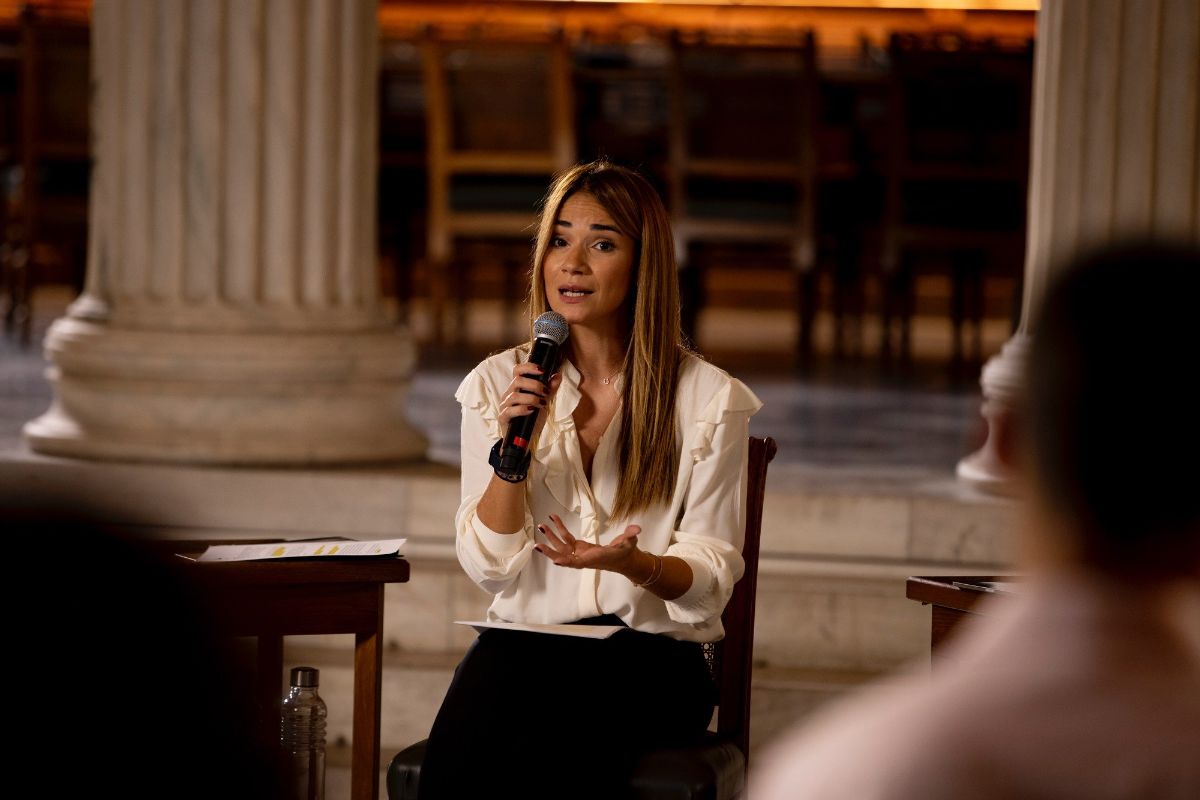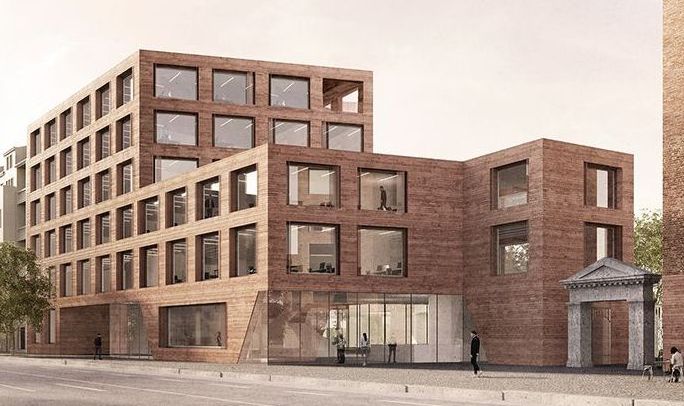Type:
Reinventing Greek journalism – Anna-Kynthia Bousdoukou, iMEdD/Stavros Niarchos Foundation (Newsletter 028)
Since our last edition, the Russian invasion of Ukraine has exacted a heavy toll on journalists, both those covering the war inside Ukraine and those trying to keep independent information alive inside Russia.
A range of domestic Ukrainian and international groups are working to support documentation of potential war crimes. As President Zelenskyy visited Bucha, the town where, to global shock, horrifying atrocities appear to have been committed by Russian forces, he told the media: “It is very important for us that journalists are here. We want you to show the world what happened here, what the Russian military did, what the Russian Federation did in peaceful Ukraine.”
Amid the outpouring of support for Ukraine, here are three examples relevant to JFF members in the journalism and funding communities:
> Supporting Ukraine’s independent media: The IPI’s media freedom tracker on the Russia-Ukraine war had counted, at the time of publication, 274 separate incidents both inside Ukraine, including the deaths of several journalists, and within Russia, in an intensifying crackdown on independent journalism. To find out about how to help independent journalists in Ukraine, visit this campaign (more at Nieman Lab).
> JX Fund launched to support journalists in exile: With 150+ journalists leaving Russia in the last month, there is renewed focus on the long-term challenge of how to support journalists in exile as a result of conflicts, surveillance & repression. RSF Germany, the Schoepflin Stiftung & the Rudolf Augstein Stiftung have launched a new “clearing house that bundles the numerous offers of help from individual & institutional donors, companies, media houses & social initiatives to strengthen independent media in exile.” Visit the JX Fund to find out more and lend your support.
> Broader philanthropic efforts to support Ukraine: please visit the Philanthropy For Ukraine and the NGOs for Ukraine online platforms, which were launched little over a week ago, and which both also include sections on journalism and disinformation.
Today’s edition:
You might remember we mentioned many editions ago a new initiative in Greece called iMEdD, or the incubator for Media Education and Development. Today we’re delighted to share an interview with its co-founder, Stavros Niarchos Foundation’s Anna-Kynthia Bousdoukou (Αννα-Κύνθια Μπουσδούκου) – you can read an extract below, and the full interview on the JFF site.
There’s still time for you to answer our short survey…
I’ll be at the International Journalism Festival in Perugia later this week, taking part in a couple of panels on media funding and policy – so if you are at the Festival, please do say hello!
And as ever do send us your feedback at info@journalismfundersforum.com or by using the social buttons below. And please keep sharing the subscribe link, to help new readers find us.
–Sameer Padania
—–
Interview: Anna-Kynthia Bousdoukou, Stavros Niarchos Foundation & iMEdD (Greece)
Journalist Anna-Kynthia Bousdoukou (Aννα-Κύνθια Μπουσδούκου) co-founded iMEdD, or the incubator for Media Education and Development, in Athens, Greece, where she serves as Managing Director. Since 2016, Anna-Kynthia has also served as an advisor to the Stavros Niarchos Foundation on grants related to journalism, and curates and presents the Foundation’s monthly forum SNFDIALOGUES.
We talked in January 2022 about the media environment in Greece, how the Stavros Niarchos Foundation supports journalism, why she co-founded a new organisation in iMEdD, and how funders in Europe and across the world need to come together.
Here’s an edited in-her-own-words extract, but you’ll find the link to read the full interview below, with some bonus content for Greek speakers too…
—–
 |
Interview: Anna-Kynthia Bousdoukou, Stavros Niarchos Foundation & iMEdD (Greece)
Journalist Anna-Kynthia Bousdoukou (Aννα-Κύνθια Μπουσδούκου) co-founded iMEdD, or the incubator for Media Education and Development, in Athens, Greece, where she serves as Managing Director. Since 2016, Anna-Kynthia has also served as an advisor to the Stavros Niarchos Foundation on grants related to journalism, and curates and presents the Foundation’s monthly forum SNFDIALOGUES.
We talked in January 2022 about the media environment in Greece, how the Stavros Niarchos Foundation supports journalism, why she co-founded a new organisation in iMEdD, and how funders in Europe and across the world need to come together.
Here’s an edited in-her-own-words extract, but you’ll find the link to read the full interview below, with some bonus content for Greek speakers too…
Anna-Kynthia Bousdoukou:
The Stavros Niarchos Foundation (SNF) is an international philanthropic organization [which] started 25 years ago, and now we are active in more than 140 countries all over the world – including Greece, the rest of Europe, the United States, and also Africa.
We focus a lot on civic discourse and the public space [which is part of the need] to support and protect democracy. A few years ago, we realized that there was a lack of transparency and quality [in journalism], [and] we saw and we realised [that] all of us as citizens need news, and we need it in order to be well-informed. Because only if we are well-informed, we can make good decisions for our common future as a society. So, the Foundation came up with ideas of how it could start supporting journalists. […] I started working with SNF in 2016 as an advisor in the field of journalism related to global grants.
[W]e support all our grantees – not only in the field of journalism – with money, […] but from the beginning, we support them in the best way we can, to become more sustainable and as strong as they need in order to be independent and find other sources of funding. The bottom line is that how could we, as a foundation, combine funding with the exchange of knowledge in specific fields and in the global journalistic community. My team and I, as journalists, believe in and support cross-border journalism, because journalists cannot be limited by borders. Nothing happens just here or just there. Everything is connected and this is actually the philosophy of the Foundation as a global organization.
In 2017, […] the Foundation and I came up with the idea of establishing this non-profit, international, journalistic organization, iMEdD, which is funded by the Foundation, [and which I run] as the founder and managing director, but at the same time I am still a member of the management team of the Foundation, through which we’re running grant making in the field of journalism worldwide. iMEdD has an international orientation, and since our beginning, we started working with colleagues, universities, media organizations both from Greece and abroad as equals. [But] all the team of journalists at iMEdD are from the media industry in Greece and we are located in Athens, so I can say that the environment [in Greece] is tough.
Obviously, a non-profit organization like iMEdD cannot change everything in three years – or in three decades – but what we have been trying to do is something totally different, especially in Greece, compared with what the existing media companies and the existing media industry do.
The incubator works with an open call. Then an independent, international jury evaluates all these ideas, and then decides the final list of who will be supported. But… we don’t have a specific number [of grants or awards] – which is very difficult for the members of the jury because we don’t tell them either the amount or the number. We don’t care about supporting ten projects per year, or 10,000. One year we might not receive good ideas, so what should we do? Support ten ideas because we said we have to support ten ideas? This is not the right way. One year we could have one good idea!
The need is so huge, much, much bigger than we thought it was. […] so we started working with a group of very active journalists in Greece, most of whom don’t have the resources to do their work. We saw how many journalists trust us, came to us, [because] we offer them as journalists the conditions they need in order first of all to have time to investigate their stories. Secondly, to have the tools to raise the issues they wanted into the stories. And third, to give them the opportunity to release all the stories without having an agenda, only [editorial] guidance and support from our side. And then we offer them the independence to release their stories whenever, wherever they decide.
So we see that while the media might be limited, the journalists are out there and they are trying to find ways to do their work and to regain this trust, and they are many. Most of them are not satisfied with what happened [to the media environment]. But they don’t have another option. […] Greece is a very small country, and we have so many [unsustainable] media companies, so that’s why we see the problem being so huge, and the lack of trust, getting bigger and bigger. [A]ll of us can understand why there is lack of transparency, a lack of trust, because I cannot understand something very simple: why does somebody own an unsustainable company? So why should I trust, how can I trust the news, right?
That’s why we aren’t working with media companies – because if media companies were doing their work well, there would be no reason for us to exist. We [are trying to show that] as journalists there’s only one way to do our work: through transparency and independence.
At this point, we are trying through iMEdD to start the change from the bottom up. […] That’s the reason why the foundation does not support only through funding, which is valuable, but is not so effective [on its own]. And believe me, it’s much harder [to give] support through this productive way, and not just a cheque.
[For the community of funders] the most important thing is to connect the dots and to have a diversity of discussions and also of synergies. Let’s come together and discuss [as funders across the world], but discuss about ideas, not only about money. Sustainability starts with money in order to give you an opportunity to build ideas.
It’s an open discussion [and] from all these pieces connected, we come up with new and fresh ideas, like iMEdD for example. If you don’t start discussing, exchanging ideas, you cannot do anything. That’s the reason why we need money but at the same time, we need ideas – in order to move on and to have a kind of evolution.
—
To read the full interview with Anna-Kynthia Bousdoukou of SNF/iMEdD, head over here…
And if you’re a Greek-speaker, there’s a terrific interview with Anna-Kynthia in Marie-Claire Magazine (in the Greek edition in August 2021), in which she observes that “Η δημοσιογραφία είναι ακριβή γιατί χρειάζεται χρόνο και είναι ακριβή γιατί χρειάζεται ανεξαρτησία.“
—–
READER SURVEY…
We’d like to ask you some questions about the newsletter, and how it can be better, so it – and JFF – can best help you in your work.
We’ve kept it short, as we know how busy you are. We’d like to know:
1. What format of JFF newsletter is most useful for you to receive in your inbox…
2. What kinds of JFF content you find useful and interesting, and what you’d like to see more of
3. People and organisations funding or investing in public interest journalism whom you think we should know about, or perhaps interview.
Click here to answer these questions.
—–
NEWS ROUNDUP
The consultation period on the European Media Freedom Act ended last week, and the JFF and Philea provided a submission focused on supporting greater recognition in law for non-profit media and the charitable status of journalism across the European Union.
The Media Freedom Rapid Response (MFRR) conference also ended recently, and all the sessions can be watched online.
This week brings the first edition since 2019 of the International Journalism Festival in Perugia in Italy. If you’re going to be there, let us know via Twitter or email.
Toolkits
You’ve heard us talk about Product Thinking in previous editions – well, the News Product Alliance has produced an English-language guide to what this concept is, and why it is important for newsrooms (and those that support them) to get their heads round it.
The UK Funders Collaborative Hub has a series of excellent resources for funders.
The industrious On Think Tanks group has produced a guide on How to Build a Think Tank, which may be of interest and use to those thinking about how to engage and push on media policy issues.
And while it’s not a new resource, it’s a timely one to spotlight – the Oxford Internet Institute‘s Programme on Democracy and Technology has a helpful guide on disinformation.
Berlin’s new House for Journalism

Journalist Maria Exner has everybody’s dream job as the founding director of the long-gestated Haus für Journalismus & Öffentlichkeit, or House for Journalism and Transparency, which will be known as PUBLIX, and is being built in the Neukölln district of Berlin. (Let us know about similar initiatives elsewhere in Europe – alongside the Time To Talk Network of debate houses, we’ve also noted in a previous edition the Maison des médias libres in Paris, funded by Olivier Legrain, and we’d love to hear of others.)
Till next time,
–Sameer
[To read the emailed version of this newsletter, click here.]
